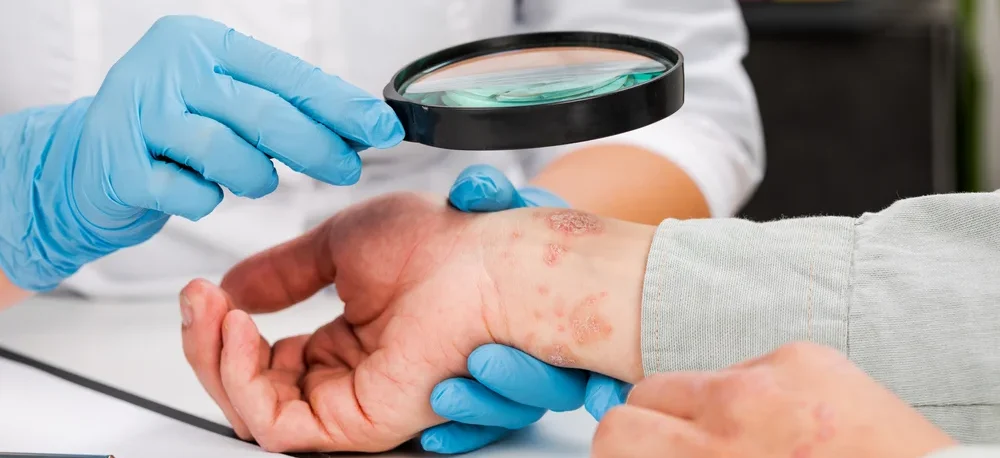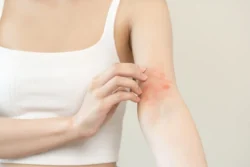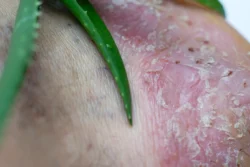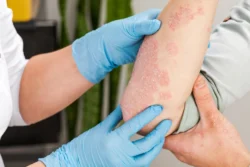
How to Cure Eczema Permanently?
Eczema, also known as atopic dermatitis, is a chronic skin condition that causes inflammation, redness, and irritation. It affects millions of people worldwide and can range from mild to severe. For those living with eczema, the itchiness, dryness, and constant flare-ups can be frustrating and disruptive to daily life. While there is no definitive cure for eczema, there are various treatments, lifestyle changes, and home remedies that can help manage symptoms, reduce flare-ups, and improve the quality of life.
In this comprehensive guide, we will explore various methods and treatments to help manage eczema symptoms, providing you with the most up-to-date information on eczema care and how to find relief. If you’re wondering whether it’s possible to cure eczema permanently, keep reading to learn how to manage this condition effectively.
What is Eczema?
Eczema, also known as atopic dermatitis, is a chronic skin condition that causes your skin to become red, inflamed, and itchy. While it can appear anywhere on the body, it is most commonly seen on the face, hands, elbows, and behind the knees. People with eczema often experience dry skin, rashes, and a persistent itch, which can range from mild to severe.
Eczema is not contagious, meaning it cannot be passed from one person to another. However, the condition can be long-lasting, and flare-ups may occur throughout a person’s life. While eczema is more commonly seen in children, it can affect people of all ages.
What Causes Eczema?
The exact cause of eczema is still unclear, but it is thought to be a combination of genetic and environmental factors. Eczema tends to run in families, and it is commonly found in people with a family history of allergies, asthma, or hay fever.
There are a few main factors believed to contribute to eczema:
- Genetics: People with a family history of eczema or other allergic conditions are more likely to develop it. Certain genes affect the skin’s ability to protect itself from irritants and allergens, leading to inflammation and eczema.
- Immune System: The immune system plays a significant role in eczema. In individuals with eczema, the immune system overreacts to triggers such as allergens, bacteria, or irritants, causing inflammation and skin irritation.
- Environmental Triggers: Many environmental factors can trigger or worsen eczema symptoms, including:
- Allergens: Pollen, dust mites, mold, and pet dander can trigger flare-ups.
- Weather: Cold weather, low humidity, or sudden temperature changes can dry out the skin and lead to eczema flare-ups.
- Harsh Soaps and Detergents: Many household cleaning products and skin care products contain chemicals that can irritate the skin and worsen eczema.
- Stress: Emotional stress can trigger eczema flare-ups or make existing symptoms worse.
- Infections: Bacterial or viral infections, like the flu or cold sores, can trigger eczema outbreaks.
- Skin Barrier Dysfunction: People with eczema have a weakened skin barrier, which means that their skin is less able to retain moisture and protect itself from irritants. This makes the skin more susceptible to dryness, irritation, and infection.
Types of Eczema
There are several different types of eczema, each with its unique characteristics:
- Atopic Dermatitis: This is the most common type of eczema. It often begins in childhood and is associated with other allergic conditions like asthma and hay fever. It causes dry, itchy skin and can appear on the face, hands, and the backs of knees and elbows.
- Contact Dermatitis: This type occurs when your skin comes into direct contact with an irritant or allergen. It is characterized by redness, itching, and swelling in the affected area.
- Dyshidrotic Eczema: This type primarily affects the hands and feet, causing small, itchy blisters filled with fluid. It is often triggered by stress, warm weather, or exposure to certain metals.
- Nummular Eczema: This type of eczema causes round or oval-shaped patches of irritated skin that may become crusted, scaly, or oozing. It often occurs after an injury to the skin.
- Seborrheic Dermatitis: This form of eczema affects areas of the body that have a lot of oil-producing (sebaceous) glands, such as the scalp, face, and chest. It results in red, flaky, and greasy patches of skin.
- Stasis Dermatitis: This type occurs in the lower legs, often in individuals with poor circulation or venous insufficiency. It causes swelling, itching, and skin discoloration.
Symptoms of Eczema
The symptoms of eczema can vary depending on the type and severity of the condition. However, some common signs of eczema include:
- Itchy Skin: The most common symptom of eczema is intense itching, which can range from mild to severe.
- Dry, Red, and Inflamed Skin: Eczema often causes the skin to become dry, red, and inflamed, and sometimes it can crack or bleed.
- Rashes: Eczema rashes can appear as raised, red bumps or patches of skin that are irritated and sensitive to touch.
- Scaly Skin: Over time, the skin affected by eczema may become rough and scaly, sometimes even thickened.
- Blisters: Some types of eczema, such as dyshidrotic eczema, can cause small, fluid-filled blisters on the skin.
- Crusting or Oozing: In more severe cases, eczema may cause open sores that ooze fluid and crust over.
Eczema can be exacerbated by scratching, leading to further irritation and potential infection. When eczema is not properly managed, it can lead to thickened skin, scars, or dark patches.

Managing Eczema: Treatment Options
While there is no permanent cure for eczema, several treatment options can help manage the symptoms, reduce flare-ups, and improve the skin’s condition. A combination of treatments, lifestyle adjustments, and home remedies can effectively control eczema and improve your quality of life.
1. Topical Treatments
Topical treatments are one of the most common approaches to managing eczema. These treatments are applied directly to the skin and work to reduce inflammation, itching, and irritation.
- Corticosteroid Creams: These are anti-inflammatory medications commonly used to treat eczema. They work by reducing redness and swelling. Mild corticosteroid creams are available over the counter, while stronger versions require a prescription. It’s important to use them as directed by your doctor, as long-term use can cause skin thinning.
- Topical Calcineurin Inhibitors: These medications, such as tacrolimus and pimecrolimus, are used to reduce inflammation and control flare-ups. They are often prescribed when corticosteroids are not effective or suitable for long-term use.
- Emollients and Moisturizers: Keeping the skin moisturized is essential for managing eczema. Emollients, or moisturizers, help seal in moisture and protect the skin from irritants. They are often applied immediately after bathing when the skin is still damp to lock in moisture. Look for fragrance-free, hypoallergenic creams and lotions for the best results.
- Coal Tar: Coal tar is a topical treatment that can help reduce inflammation and slow the production of skin cells. It is particularly helpful for conditions like seborrheic dermatitis and psoriasis, but it can also benefit eczema.
2. Oral Medications
In cases where topical treatments are not enough, oral medications may be prescribed to help control eczema symptoms.
- Antihistamines: These are often used to reduce itching. Antihistamines block the action of histamine, a substance that is released during allergic reactions and can contribute to itching and inflammation.
- Oral Steroids: In more severe cases of eczema, short courses of oral steroids may be prescribed to reduce inflammation. However, long-term use of oral steroids can have significant side effects, so they are generally used only for short-term flare-ups.
- Immunosuppressants: In some cases, medications that suppress the immune system, such as methotrexate or cyclosporine, may be prescribed for individuals with severe eczema who do not respond to other treatments.
3. Light Therapy (Phototherapy)
Phototherapy, or light therapy, involves exposing the skin to ultraviolet (UV) light under controlled conditions. This treatment helps reduce inflammation and slow the growth of skin cells. Phototherapy is typically used for individuals with moderate to severe eczema who do not respond to topical treatments.
There are two types of phototherapy commonly used for eczema:
- UVB Narrowband Therapy: This involves exposing the skin to UVB light, which is effective in reducing inflammation and controlling eczema flare-ups.
- PUVA Therapy: This therapy involves the use of a drug called psoralen, which makes the skin more sensitive to UVA light. PUVA therapy is used for more severe cases of eczema but may have more side effects.
4. Wet Wrap Therapy
Wet wrap therapy involves applying a damp cloth or dressing to the skin after it has been treated with moisturizers or corticosteroids. The wet wrap helps keep the medication in contact with the skin for a longer period and increases absorption. This technique can be very effective for managing eczema flare-ups, especially in children, as it helps soothe irritated skin and prevent scratching.
Lifestyle Changes to Manage Eczema
Along with medical treatments, making lifestyle changes can play a vital role in managing eczema. Small adjustments to your routine can help reduce flare-ups and keep your skin healthy.
1. Avoid Triggers
One of the most important steps in managing eczema is identifying and avoiding triggers that can worsen the condition. Some common triggers include:
- Allergens: Dust mites, pet dander, pollen, and mold can trigger eczema flare-ups.
- Skin Irritants: Certain fabrics like wool, harsh soaps, fragrances, and chemicals in cleaning products can irritate the skin.
- Extreme Weather: Both hot and cold weather can affect the skin. Dry, cold air can cause the skin to lose moisture, while hot, humid conditions can lead to sweating and irritation.
- Food Allergies: Certain foods, such as dairy, eggs, nuts, and soy, may trigger eczema in some individuals. If you suspect food allergies are contributing to your eczema, it’s a good idea to consult an allergist.
- Stress: Emotional stress can lead to eczema flare-ups or worsen existing symptoms. Managing stress through techniques like mindfulness, yoga, or deep breathing exercises can be helpful.
2. Maintain a Consistent Skin Care Routine
- Bathing Tips: Bathing is an essential part of eczema care, but it’s important to avoid hot water, as it can dry out the skin. Opt for lukewarm water instead and limit the time spent in the bath. Use a gentle, fragrance-free cleanser or oatmeal-based bath products to soothe irritated skin.
- Moisturizing: After bathing, immediately apply a fragrance-free, hypoallergenic moisturizer to lock in moisture. This helps restore the skin’s natural barrier and prevent dryness. Ointments and creams are generally more effective than lotions for eczema-prone skin.
3. Wear Soft, Breathable Clothing
Clothing made from natural fabrics, such as cotton, can help prevent skin irritation. Tight or rough fabrics like wool or synthetic fibers can aggravate eczema, so it’s best to avoid wearing them. Also, wash your clothes with a mild, fragrance-free detergent to avoid skin reactions.
4. Manage Stress Effectively
Since stress is a known trigger for eczema flare-ups, finding ways to manage stress is crucial. Practicing relaxation techniques like meditation, mindfulness, and deep breathing exercises can help reduce stress levels and prevent flare-ups.
Home Remedies for Eczema Relief
In addition to medical treatments, there are several home remedies that can help relieve eczema symptoms and soothe irritated skin. These remedies are not a cure for eczema but can be effective in managing flare-ups and improving skin health.
1. Coconut Oil
Coconut oil is known for its moisturizing and anti-inflammatory properties. Applying virgin coconut oil to affected areas can help hydrate the skin and reduce redness and itching. It is also thought to have antimicrobial properties that may help prevent infection.
2. Aloe Vera
Aloe vera is another natural remedy that has cooling, soothing, and anti-inflammatory effects. The gel from an aloe vera plant can be applied directly to eczema-affected areas to reduce irritation and hydrate the skin.
3. Oatmeal Baths
Colloidal oatmeal has long been used to soothe itching and inflammation. Taking an oatmeal bath can help relieve eczema symptoms by moisturizing the skin and reducing irritation. Simply add colloidal oatmeal to a warm bath and soak for about 15-20 minutes.
4. Honey
Honey has natural antibacterial and moisturizing properties. It can be applied topically to help reduce inflammation, prevent infection, and speed up the healing process of eczema-affected areas.

When to Seek Professional Help
While these treatments and lifestyle changes can be effective for managing eczema, it’s important to seek professional help if your symptoms become severe, persistent, or unmanageable. A healthcare provider, such as a dermatologist, can assess your condition and recommend stronger treatments or therapies to help control eczema.
Some signs that it’s time to see a doctor include:
- Widespread or severe eczema that does not improve with over-the-counter treatments
- Skin infections, such as oozing or crusted areas
- Severe itching that affects your quality of life
- Difficulty managing flare-ups with lifestyle changes and home remedies
Long-Term Management of Eczema
Eczema is a chronic condition, meaning that while it can often be managed effectively, it may not go away completely. The goal of long-term management is to reduce flare-ups, keep the skin as healthy as possible, and improve your overall quality of life. Here are some strategies to help with the ongoing management of eczema:
1. Consistent Skincare Routine
Maintaining a consistent skincare routine is crucial for long-term eczema management. This involves regular moisturizing, avoiding skin irritants, and keeping the skin hydrated. Make sure to stick to a routine that works for your skin, and avoid skipping steps that can help prevent dryness and irritation.
- Daily Moisturizing: Apply a thick layer of moisturizer to your skin every day, especially after bathing. This helps to strengthen the skin barrier, lock in moisture, and prevent the skin from becoming dry and irritated.
- Gentle Cleansers: Use mild, fragrance-free cleansers that are designed for sensitive skin. Avoid using hot water, as it can strip the skin of its natural oils. Opt for lukewarm water instead.
- Avoid Scratching: Although eczema is often very itchy, scratching can further irritate the skin, leading to more inflammation, infection, and scarring. Keep your nails short to reduce the risk of scratching, and try to distract yourself when you feel the urge to scratch.
2. Identify and Avoid Triggers
Eczema flare-ups are often triggered by environmental factors or lifestyle habits. Identifying and avoiding these triggers is an essential part of managing eczema in the long term. Some common triggers include:
- Allergens: Common allergens such as dust mites, mold, pet dander, and pollen can trigger eczema. If you’re allergic to any of these, try to minimize exposure by using air purifiers, washing bedding regularly, and avoiding pets if necessary.
- Chemical Irritants: Household cleaning products, harsh soaps, and fragrances can irritate the skin and worsen eczema. Opt for fragrance-free and hypoallergenic products that are gentle on the skin.
- Heat and Sweating: Excessive sweating can lead to skin irritation and eczema flare-ups, particularly in warm or humid weather. Try to stay cool and wear loose, breathable clothing to reduce sweating. Use fans or air conditioning to maintain a comfortable indoor temperature.
- Stress: Emotional stress is a known trigger for eczema. Developing effective stress-management strategies, such as yoga, meditation, or deep breathing exercises, can help prevent flare-ups.
3. Avoid Overusing Topical Steroids
While corticosteroid creams are often prescribed to manage eczema flare-ups, overusing them can lead to side effects such as thinning of the skin or worsening of the condition over time. It’s important to use topical steroids as directed by your healthcare provider and only for the prescribed duration. If you’re concerned about long-term steroid use, discuss alternative treatments, such as topical calcineurin inhibitors, with your doctor.
4. Monitor Diet and Food Allergies
Certain foods can trigger eczema flare-ups in some individuals, especially in children. Common food allergens include:
- Dairy products
- Eggs
- Nuts
- Wheat
- Soy
If you suspect that your eczema may be related to food allergies, consider working with an allergist or dermatologist to identify the foods that may be triggering your symptoms. A food elimination diet, under the guidance of a healthcare professional, can help pinpoint potential food allergens.
Prevention Tips to Minimize Eczema Flare-Ups
While you may not be able to completely prevent eczema, there are several strategies you can implement to minimize flare-ups and reduce the frequency and severity of symptoms.
1. Keep the Skin Moisturized
Dry skin is a major factor in eczema flare-ups, so it’s crucial to keep your skin well-hydrated. Apply a thick, fragrance-free moisturizer at least twice a day, especially after bathing or washing your hands. Moisturizers help to lock in moisture and protect the skin barrier, preventing it from becoming dry and irritated.
2. Avoid Hot Showers and Baths
Hot water can strip the skin of its natural oils, leading to dryness and irritation. To prevent flare-ups, take lukewarm showers or baths instead. Limit the amount of time you spend in the water, and avoid using harsh soaps or bubble baths, as these can further dry out your skin.
3. Wear Soft, Comfortable Clothing
Tight, rough, or irritating fabrics can worsen eczema symptoms. Choose clothing made from soft, breathable materials like cotton. Avoid wool and synthetic fabrics, which can scratch or irritate the skin. Be sure to wash your clothes with a mild detergent and avoid fabric softeners, which can contain fragrances that trigger eczema.
4. Humidify Your Home
Dry air, especially in winter, can make eczema worse. Using a humidifier in your home helps maintain moisture in the air and prevents your skin from becoming too dry. This is especially important in bedrooms during the colder months.
5. Practice Stress Management
Since stress is a common trigger for eczema, finding ways to relax and manage stress is crucial. Try activities like yoga, deep breathing exercises, meditation, or journaling to keep your stress levels in check. Regular physical activity can also be helpful in reducing stress and improving overall well-being.
6. Consider Allergy Testing
If you suspect that allergens are contributing to your eczema, it may be worth undergoing allergy testing. Identifying specific triggers, such as pollen, dust, or certain foods, can help you avoid these allergens and reduce the frequency of eczema flare-ups.
7. Use Gentle Skincare Products
Choose skincare products that are free from fragrances, dyes, and harsh chemicals. Look for gentle, non-irritating products that are designed for sensitive skin. Many skincare brands offer eczema-friendly products that are formulated to soothe and hydrate the skin without causing irritation.

When To See A Doctor
While eczema can often be managed at home, there are times when you should consult a healthcare provider. If your eczema becomes severe, persistent, or difficult to manage, it’s important to seek professional advice. Some signs that you should see a doctor include:
- Severe itching that affects your daily activities or prevents sleep
- Infection in the affected areas, such as increased redness, warmth, swelling, or oozing
- Eczema that doesn’t respond to over-the-counter treatments or lifestyle changes
- Widespread eczema that covers large areas of your body
A dermatologist can provide stronger medications, therapies, or treatment options that may be more effective in controlling your eczema.
Managing Eczema For A Better Quality of Life
While there is no permanent cure for eczema, it is possible to manage the condition effectively and minimize flare-ups with the right combination of treatments and lifestyle changes. By maintaining a consistent skincare routine, avoiding triggers, and managing stress, you can significantly improve the quality of your life and keep eczema under control.
Remember that eczema management is a personalized approach, and what works for one person may not work for another. Be patient, work closely with your healthcare provider, and make adjustments as needed to find the best treatment plan for you. With the right care, you can live comfortably with eczema and reduce its impact on your daily life.
